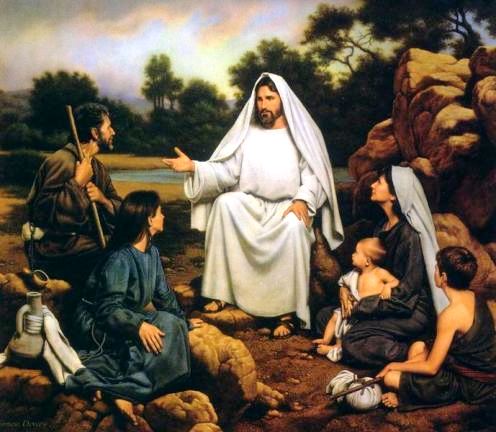"Every one then who hears these words of mine and does them will be like a wise man who built his house upon the rock [petra];
and the rain fell, and the floods came, and the winds blew and beat upon that house, but it did not fall, because it had been founded on the rock [petra].
And every one who hears these words of mine and does not do them will be like a foolish man who built his house upon the sand; and the rain fell, and the floods came, and the winds blew and beat against that house, and it fell; and great was the fall of it." Matt. 7: 24-27; see also Luke 6:48
If you do a search of the word "rock" in the Old Testament, you will soon discover that it is often used to describe God. God is a rock. The Greek words for rock "petra" and "lithos" are also used for Christ Himself:
"for they drank from the spiritual rock [petra] that accompanied them, and that rock was Christ." I Cor. 10:4
"The stone [lithos] which the builders rejected, the same is become the head of the corner." Matt. 21: 42; Mark 12: 10; Luke 20: 17; Acts 4: 11; I Peter 2: 6, 7
Jesus gave Peter the title of rock, a description of Himself:
And I tell you that you are Peter, and on this rock [petra] I will build my church, and the gates of Hades will not overcome it. Matt. 16: 18
And when Jesus beheld him, he said, Thou art Simon the son of Jona: thou shalt be called Cephas, which is by interpretation, a stone [petros]. John 1: 42
His other disciples are considered part of the stone foundation.
And are built upon the foundation of the apostles and prophets, Jesus Christ himself being the chief corner stone; Eph. 2: 20
So when the Jesus talks about the rock, He is describing the authority of the Kingdom, both Himself and Peter, His chief administrator and Prince of His Apostles, as well as the other Apostles. All of these leaders are the foundation of His church. Yet they are one stone foundation, not many. One.
The Rock.
When Christ tells His disciples that a wise man builds his house upon the rock, He is speaking of the foundation of not only Christ Himself, but of Peter and the Apostles. They are all the rock foundation.
Why would Christ choose the image of sand as a false and foolish foundation? Why not mud or water or air? No, Christ chose the image of little rocks. Little false rocks--many, many of them. What could be these little rocks?
It seems to me a fairly easy guess. Protestantism brought in the idea that the church isn't one, organized body. There are now thousands of little foundations in denominationalism and even more people who reject church altogether who have become little independent foundations. If you call yourself a Christian but build your foundation upon some other rock than the rock Christ gave us in Peter and the Apostles, you are in for a big shock when a spiritual storm blows.
Jesus knew that this rock foundation of Himself and the Apostles would offend the independent-minded, those who wish to be their own church and their own spiritual authority.
I lay in Zion, "a stone [lithos] that causes men to stumble and a rock [petra] that makes them fall." I Peter 2: 8; Rom. 9: 33 See also: Matt. 21: 44; Luke 20:18.
Build your foundation on The Rock of Jesus and Peter. You will be safe.




3 comments:
According to your church fathers:
Origin-The rock means every disciple of Christ.
Tertullian-The entire church which is near to Peter is the rock.
Ciprian- The entire body of the bishops in communion with Peter is the rock.
Chrysostom- The rock is the faith confessed by Peter.
Augustine- The rock is not Peter but rather Jesus Christ though I must admit that there are some who believe it was Peter.
Jehovah is always the Rock.
"For I proclaim the name of the Lord: Ascribe greatness to our God. HE IS THE ROCK, His work is perfect;for all His ways are justice, a God of truth and without injustice; righteous and upright is He." Deut 32:3,4
"…all ate the same spiritual food, and all drank the same spiritual drink. For they drank of that spiritual Rock [petra] that followed them, and that Rock [petra] was Christ." 1 Cor. 10:3,4
"This is the stone which was rejected by you builders, which has become the chief cornerstone. NOR IS THERE SALVATION IN ANY OTHER, FOR THERE IS NO OTHER NAME UNDER HEAVEN GIVEN AMONG MEN BY WHICH WE MUST BE SAVED." Acts 4:11-12
The church built upon the Rock means that it is founded upon Jesus as found in the writings of the apostles and the prophets.
"Now therefore, you are no longer strangers and foreigners, but fellow citizens with the saints and members of the household of God, having been built on the foundation of the apostles and prophets [not Peter], Jesus Christ Himself being the chief cornerstone, IN WHOM THE WHOLE BUILDING, being joined together, grows into a holy temple in the Lord, in whom you also are being built together for a dwelling place of God in the Spirit." Eph. 2:19-22.
To build on the Rock means to build upon what Jesus says. The church is built upon the Word of God.
"Therefore whoever hears these sayings of Mine, and does them, I will liken him to a man who built his house on the rock…Now everyone who hears these sayings of Mine, and does not do them, will be like a foolish man who built his house on the sand." Matt. 7:24,26.
The sand does not represent Protestantism. The answer to what sand represents is in the parable itself. Matt. 7:24 Jesus says "Whoever hears my words and does them is like a wise man who built his house on a rock, 25 and rain and winds blew and beat that house, and it did not fall.
Sand shifts when flood and wind come, in Scripture Rev 12, and Rev 7 flood and winds are tribulation! According to 1 Timothy 3:15, House is church. If the house of God (Church) is not built on the Word of God, when tribulation comes (rain, wind) it will not stand. False doctrines, false ideas of God (and Peter) are sand.
Truth is Teresa, all the Apostles were given the Keys (Matt. 18:15-18.
The keys is the knowledge of God that opens the Kingdom of God, they open the door of faith (Acts 14:27-28, Matt. 23:13, Luke 11:52, Luke 1:76,77).
Sorry Teresa, but you sound more like the Pharisees who claimed to preserve, interpret and define the teachings of the OT, but actually they prevented people from entering into the kingdom. (John 5:39)
"So when the Jesus talks about the rock, He is describing the authority of the Kingdom, both Himself and Peter, His chief administrator and Prince of His Apostles, as well as the other Apostles. All of these leaders are the foundation of His church. Yet they are one stone foundation, not many. One."
It is clear that Peter himself emphatically disclaims, by his own teaching, that the "rock" of which Jesus spoke of referred to him. Acts 4:8-12 "....By the name of Jesus Christ....This is the stone which was rejected by you builders, which has become the chief cornerstone. Nor is there salvation in any other, for there is no other name under heaven given among men by which we must be saved."
Paul is clear that Christ Himself is the Rock that went with His people in ancient times ( 1 Cor. 10:4). And in a secondary sense the truths that Jesus spoke are also a "rock" on which men may build safely and securely. (Matt. 7:24,25), For Jesus Himself is the Living Word made flesh (John 1:1,14, Mark 8:38, John 3:34, 6:63,68, 17:8)
Your idea of these metaphors (Rock, Cornerstone, Foundation) being used as evidence of your church's authority is exactly why it was introduced as a doctrine in your church. Looking for Biblical support on behalf of the bishop of Rome in the 5th century is when Leo I took the words of Christ from their original context and interpreted them to mean Peter was the Rock to bolster his claim of the primacy of the church.
Strange that no Roman bishop before then discovered this meaning of Christ's words until a 5th century bishop needed to find some Biblical support for papal primacy.
Had Christ made Peter chief among the disciples, they would not have been involved in repeated arguments about which of them would be accounted greatest.
Scripture is clear the "keys" are the words of Christ that admits us into the Kingdom of God! Is it not central for any and all Christians to confess what Peter said "You are the Christ, the Son of the Living God?" This realization is the key to the door of salvation. It is incidental and not fundamental, that Peter was the first to recognize and declare his faith, which he did as a spokesman for all the disciples.
"Whatsoever you shall bind on earth shall be bound in heaven; and whatsoever you loose on earth shall be loosed in heaven" Matt. 18:18.
The literal translation:
Verily I say to you, Whatever things ye may bind upon the earth shall be having been bound in the heavens, and whatever things ye may loose on the earth shall be having been loosed in the heavens.
Matthew 16:19 "And I will give unto thee the keysof the kingdom of heaven: and whatsoever thou shalt bind on earth shall be bound in heaven: and whatsoever thou shall loose on earth shall be loosed in heaven."
Literal translation:
And I will give to thee the keys of the reign of the heavens, and whatever thou mayest bind upon the earth shall be having been bound in the heavens, and whatever thou mayest loose upon the earth shall be having been loosed in the heavens.
The meaning is clear-The church on earth will require only what heaven requires and prohibit only what heaven prohibis. The decisions of the church will only be ratified in heaven if the decisions are in harmony with the principles of heaven. The apostles were to teach new converts to "observe all things whatsoever" Christ had commanded, no more and no less (Matt 2:21-27).
"Whosoever hears My Words and does them, shall be like a man who builds his house upon a rock..." Matt. 7:24
Jesus is the chief cornerstone which according to Paul in Eph 2:2,we are the building fitly framed together and growing unto a holy temple in the Lord, built on the foundation of all the apostles and prophets. There is no preeminence of Peter as chief administrator or prince of the apostles. The foundation must be lined up with the cornerstone or else the building is unstable. This metaphor is in harmony with the literal translation of the authority of God's church being in harmony with Jesus. The church does not have the right to require anymore or any less than what heaven requires, if it deviates from the word of God it has a foundation that is out of line with the Chief Cornerstone and built upon the sand.
Post a Comment